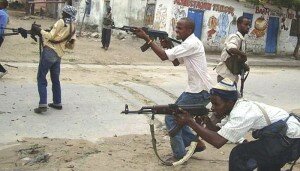Somalia Violence Intensifies Debate on Weapons

Batamaha (Nairobi)-As insecurity persists in Somalia – on land and in the waters off its coast – a debate is intensifying within the international community on how best to deal with the violence, and whether more weapons for security are the solution or part of the problem.
Fighting involving Islamist rebels has taken place this month on an almost daily basis in the capital, Mogadishu, where the United Nations and African Union-backed transitional government controls only some neighborhoods.
In the waters off Somalia’s coast, several boats and their crews have been released this month. But another ship has been seized, despite increased international patrols. Most of the captured vessels are released after a ransom is paid.
Mohamed Zayed, a security contractor working in Somalia, recommends that ships sailing off the coast arm themselves.
“We have talked about the private sector hardening their targets with on board security, which I think, is important, ” said Mohamed Zayed. “I think historically, all of the ships, some hundreds of years ago, were heavily armed to [these] sort [of] attacks of piracy as just a normal day’s business. But for the last few hundred years, there has not been piracy at this level.”
Zayed and the U.S. company he works for, Phoenix Intelligence Support Services, are also helping to train Somalia’s intelligence and security forces. He says he believes that boosting the transitional government’s security is the best way to return Somalia to stability.
Zayed also says he is confident in the leadership now in place in Somalia, even though it seems to be barely hanging on and that some government leaders – including President Sharif Sheik Ahmed – had been Islamist leaders fighting against Western-backed forces.
“The senior cabinet members, the president, the prime minister, the deputy prime minister, all of the key ministers are very credible, good people,” he said. “Many of them are educators; they are not military strongmen. They are professors, teachers. I can guarantee you one thing; this is the best chance for a transitional government to be effective in stabilizing Somalia than we have seen in more than 20 years.”
But Benedicte Goderiaux, an expert on armed conflict in Africa at Amnesty International in London, sees many potential problems in the international community’s support for the transitional government.
“This is fine as long as it is not done at the expense of the human rights of civilians in Somalia,” said Benedicte Goderiaux.
Goderiaux says she worries about what she calls the opaque training of security forces by contractors in neighboring countries. She also cautions about weapons being given to the transitional government ending up in the wrong hands.
And, she says, Somali government forces should be scrutinized.
“Providing funding and support to a government whose forces have in the past committed very serious abuses, it poses a question of possible complicity of the international community in the commission of such abuses,” said Goderiaux. “What we would like the international community to do is to ensure that they do not give this support without question. For instance, when you have reports of civilians killed in shelling in Mogadishu, for instance, which has been occurring in the past few weeks, that the international community asks questions of the transitional government.”
The main rebel group, al-Shabab, has been linked to al-Qaida and the international community is concerned that Somalia could become a major haven for extremists.
Meanwhile, analysts are calling for balancing concerns over terrorism with security for Somali civilians to avoid a cycle of violence and a perpetually failing state.
Source: VOA
Comments
comments
 Calendar
Calendar





































